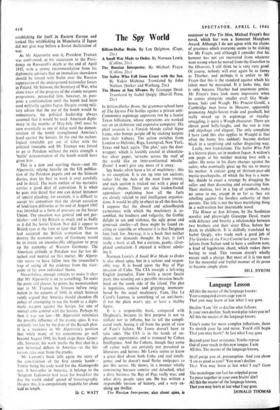The Spy World
A Small War Made to Order. By Norman Lewis. (Collins, 21s.) The Russian Interpreter. By Michael Frayn. (Collins, 21s.) The Sailor Who Fell from Grace with the Sea. By Yukio Mishima. Translated by John Nathan. (Seeker and Warburg, 21s.)
IN Billion-Dollar Brain, the grammar-school hero of The Iperess File battles against a private anti- Communist espionage apparatus run by a fascist Texan billionaire, whose operations are worked out on an elaborate and expensive computer. His chief assassin is a Finnish blonde called Signe Laine, who bumps people off by sticking hatpins into their kidneys. The action switches from London to Helsinki, Riga, Leningrad, New York, Texas and back again. 'The plot,' says the dust- wrapper, which is lavishly coated in chocolate- bar silver paper, 'screams across the roof of the world like an inter-continental missile.' Zoom! I won't give any more of it away.
Spy books often have a lot of machinery: this is no exception. It is cut up into ten sections, rather like the Acts of the man from UNCLE; and each section is tricked out with a piece of nursery rhyme. There are also leaden-footed appendices explaining how all the facts are closely related to real intelligence organisa- tions. It would be silly to object to all this hoo-ha. I suppose that the absurd and schoolboyish earnestness with which the machinery is as- sembled, the loudness and vulgarity, the Gothic delight in sex and violence, the ugly prose and gimcrack similes—all these might be found ex- citing or soporific or whatever it is that Deighton fans look for. Anyway, it is a book that neither thinks nor demands thought. In fact, it isn't really a book at all, but a curious, gaudy, silver- plated confection. I enjoyed it without admir- ing it.
Norman Lewis's A Small War Made to Order is also about spies, but in a serious and respon- sible way. It is based upon the Bay of Pigs invasion of Cuba. The CIA inveigle a left-wing English journalist, Fane (with a secret fascist past), into scouting out a possible invasion beach- head on the south side of the island. The plot is ingenious, concise and gripping, unencum- bered by the usual machinery. Fane, like Le Carres Leamas, is something of an anti-hero: if not the plain man's spy, at least a shabby figure.
It is a responsible book, compared with Deighton's, because its first purpose is not to titillate nor to inflame, but to tell the compli- cated truth. Seeing it all from the point of view of Fane's failure, Mr Lewis doesn't have to take sides. The CIA is in the hands of un- pleasant opportunists and is trounced by Cuban Intelligence. And the Cubans, though they come off rather well, are certainly not presented as liberators and heroes. Mr Lewis seems to know a great deal about both Cuba and real intelli- gence, and he doesn't need flashy endpapers to put this across. He shows, in a manner wholly convincing because concise and detached, what a dirty business the Bay of Pigs really was; and what dirty people spies are. He has written a responsible version of history, and a very ex- citing spy thriller.
The Russian Interpreter, also about spies, is successor to The Tin Men, Michael Frayn's first novel, which has won a Somerset Maugham Award. Although I do not agree with the claims of greatness which everyone seems to be staking for Mr Frayn, and although I consider that his humour has not yet recovered from whatever went wrong when he moved from the Guardian to the Observer, I still think he is very very good. Of course, nobody will ever again be as funny as Thurber, and perhaps it is unfair to Mr Frayn that this is the standard against which his talent must be measured. If it looks tiny, that is only because Thurber had enormous genius. Mr Frayn's lines look more impressive when he comes alongside smaller craft like Wode- house, Saki and Waugh. His Proctor-Gould, a Cambridge man loose in Moscow, apparently promoting Anglo-Soviet trade and goodwill, but really mixed up in espionage or royalty- smuggling, is quite a Waugh character. There are eleven good belly-laughs, and the rest is trim and shipshape and elegant. The only complaint I have (and this also applies to Waugh) is that often the funny bits suddenly become darkest black in a surprising and rather disgusting way.
Lastly, two translations. The Sailor Who Fell is a bizarre piece, set in modern Japan. A widow's son peeps at his mother making love with a sailor. He notes in his diary charges against the sailor, who eventually gives up the sea to marry his mother. A sinister gang of thirteen-year-old mystic-psychopaths, of which the boy is a mem- ber, decide to exact a revenge by drugging the sailor and then dissecting and eviscerating him. Their motives, lost in a fog of symbols, make no sense to me, except in so far as they are rebelling against the loveless authority of their parents. The title is not the least mystifying thing in a well-written but inscrutable novel.
The House at San Silvano, by the Sardinian novelist and playwright Giuseppe Dessf, traces with delicacy and brevity a relationship between two brothers and their sister Elisa, before her death in childbirth. It is skilfully translated by Isabel Quigly, who made such a good job of The Garden of the Finzi-Contini last year. Trans- lations from Italian tend to have a uniform note, a kind of lugubrious chant, which makes them boring to read. This version doesn't wholly escape such a charge. But most of it is too neat for the mournful and fretful manner of its prose to become simply glum.
BILL BYROM


































 Previous page
Previous page